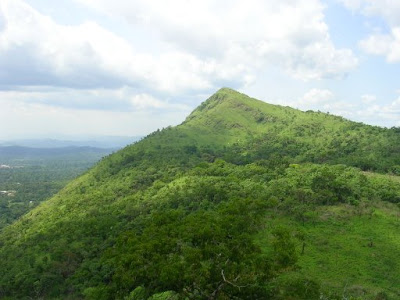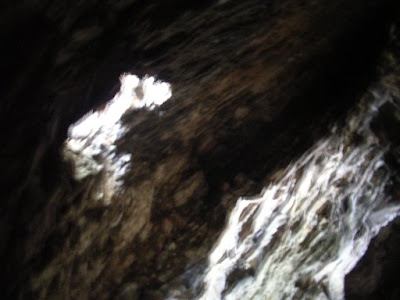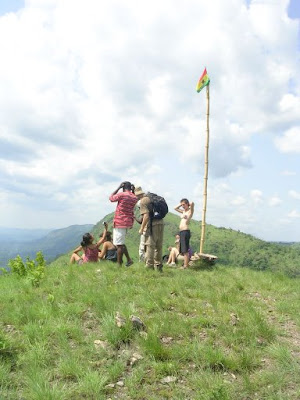My plan to go to Benin was temporarily foiled when I found out my friend Sarah was at her dorm quite sick. After a sleepless night for her, a group of four of us went to a new hospital (she'd had a bad experience at the closest one), and she was seen by a doctor. There was a lot of downtime with an IV plugged into her, and I was mostly in charge of making food runs, until we eventually all fell asleep, Sarah in her bed and the three companions on the floor. We awoke quite early the next day (they had tried to kick us out, but we didn't want to leave Sarah alone in a new hospital), she was discharged after a few hours of waiting and we went out to breakfast (the hospital was located in a part of town with tons of restaurants). Tired and worn down, I decided to take the day off to do basically nothing. Two days later, I took off with my friend Raia to go to the nearby Shai Hills reserve, a few hours north of Accra.
 We walked into the park (we had arrived a little late, but the guards took pity on us), and got our guide: a friendly man who had just moved into town from Mole, the large park in the north. We talked a lot about wildlife management issues (there's a quarry that has opened across from the park, and it has scared all of the animals far inside the borders, threatening to move them outside of the protected zone), and enjoyed the nice views. It was so green. This is a picture of our guide standing next to a four-trunked baobab tree. I have mentioned these trees before because I have loved them ever since I read The Little Prince. Things that come in fours also remind me of my siblings, and I always self-consciously check the third thing to make sure it's up to snuff :-)
We walked into the park (we had arrived a little late, but the guards took pity on us), and got our guide: a friendly man who had just moved into town from Mole, the large park in the north. We talked a lot about wildlife management issues (there's a quarry that has opened across from the park, and it has scared all of the animals far inside the borders, threatening to move them outside of the protected zone), and enjoyed the nice views. It was so green. This is a picture of our guide standing next to a four-trunked baobab tree. I have mentioned these trees before because I have loved them ever since I read The Little Prince. Things that come in fours also remind me of my siblings, and I always self-consciously check the third thing to make sure it's up to snuff :-) After we'd hiked for a while, we started going up and down relatively steep slopes until we got to the highest point on the reserve. Shai Hills is named for the Shai people, who lived relatively peacefully in this area, but moved into caves to avoid Ashante slave-raiders. They lived largely in caves like these ones for a very long time until the park was established and they were relocated. I talked to Raia a lot about how it would be to be raised in a cave. I'm sure they spent plenty of time outside, but I have a very dark and mysterious view of caves, so I can't imagine calling one home. The spaces looked a little cramped too.
After we'd hiked for a while, we started going up and down relatively steep slopes until we got to the highest point on the reserve. Shai Hills is named for the Shai people, who lived relatively peacefully in this area, but moved into caves to avoid Ashante slave-raiders. They lived largely in caves like these ones for a very long time until the park was established and they were relocated. I talked to Raia a lot about how it would be to be raised in a cave. I'm sure they spent plenty of time outside, but I have a very dark and mysterious view of caves, so I can't imagine calling one home. The spaces looked a little cramped too.

We were then introduced to the strategic advantage of this cave in particular when we hiked to its top. It was interwoven with these beautiful veined leaves from bushes, and presents an incredible panoramic view. This was used as a look out post to warn the Shai about any advancing armies of slave-raiders. Raia and I are both from San Francisco, so the idea of no hills on the horizon was pretty spectacular to both of us. It's so flat!
After resting on the cave-top for a while, we walked back to the entrance, spotting a far off baboon on the way, we got back to the main road and were thwarted by the local inn that had doubled its prices since our copy of the guidebook was printed. We caught a tro-tro (large minivan) going up the main road to the next town and got a swanky hotel room for the night. We ate a nice meal, but couldn't finish our food, so we tried to use the air-conditioner to refrigerate it to no avail. I attempted to study for my first final, but Raia tempted me with an extra copy of the New Yorker.
The next morning we awoke and traveled by tro-tro to the large bead market in Koforidua. It was cool to see, but since I'd already been on a Twi field trip, I found a shady spot to sip a pure water and study for real. I got through a few lectures when Raia found me. We wandered through the market looking for crepes, which I'd found last time, and ran into one by chance. We then took a tro tro to Boti Falls, and met the man in the office at the front gate, Ben. He represented the slowness of Ghana to me. Each word was carefully drawn out and he left large pregnant puases between each sentence. This served to be more of a welcome than a put off and he seemed genuinely excited that we would stay with him and his brother. We were shown into our small room next to Ben's with no water or electricity, and one window on the far side. When I opened it green light poured in through the massive leaves on thin stems around us. We both laid down for a while and then eventually took a short trip down to the waterfall. It was so magical, and I fear these pictures don't adequately portray it. I sat there wondering about fantasy for a long time, because I had just started a Harry Potter book in Legon. I wondered, looking at the falls, if fantasy helps or hinders people's ability to see the magic that exists in this world. I realized that I am clinging to the fantasy genre here not to escape hard times but because in so many ways life in Ghana is like a fantasy story. I have landed in this place with so much mysticism in the scenery and in a culture that I surely don't understand. So many things are close to the same as at home while being so incredibly, incomprehensively different.
 We returned up the concrete stairs in the dark back towards our room and were called to dinner, which we ate under a tin roof as small nuts fell on it making it feel like we were in an incredible rainstorm. The darkness was absolute, and you could see the sphere of light our small lantern made. Tired from a long day, we returned to our room, read, (studied) and slept. The next morning we ate breakfast, I studied more and we wandered around the grounds, saying goodbye to the falls. Raia informed me that waterfalls bring good luck when studying for a hydrology exam, and that eased my mind about studying. We caught a tro-tro back to campus.
We returned up the concrete stairs in the dark back towards our room and were called to dinner, which we ate under a tin roof as small nuts fell on it making it feel like we were in an incredible rainstorm. The darkness was absolute, and you could see the sphere of light our small lantern made. Tired from a long day, we returned to our room, read, (studied) and slept. The next morning we ate breakfast, I studied more and we wandered around the grounds, saying goodbye to the falls. Raia informed me that waterfalls bring good luck when studying for a hydrology exam, and that eased my mind about studying. We caught a tro-tro back to campus.***
I then found out that my roommate had gone to the hospital. I brought him all of his necessary possessions from our room and we had one of our longest conversations with the BBC news in the background. Neither of us had seen news in months, so it was fun to just chat. After sunset I caught a car back to campus.
***
The next few days were rather uneventful. I took my first final. The way that works is like this: you know what day and time your final is based on the exam schedule they posted about a month ago. Each day at around 6pm they post green sheets in the dormitory lobbies that say which building each exam will be in. That's right, you couldh ave a final at 7:30 and not even know which building it's in unti lthe night before. You then arrive at the building early with nothing but your idea and a pen or they get upset. Half an hour before it starts, they hand out the exam questions and booklets and you're allowed to scribble on the question sheet. The exam starts, and you fill up these booklets answering the questions (all essays for me), and if you need extra sheets you tie them on with string in a very romantic kind of way. The exams are moderated by Invigilators (sounds like a super-villain if I've ever heard one...), and during the course of the 2.5-3 hours at least two of them and, if you're white, somebody from the international students office come around to check your id against your picture that they have on file, and ask you to sign in. That's the story with those. The following day I packed my bag in the morning and headed off on a solo-trip to Benin, a story in and of itself





















































